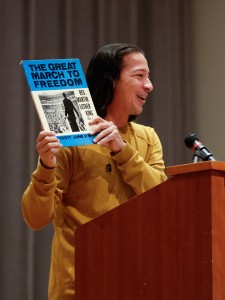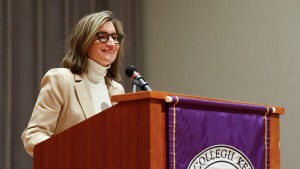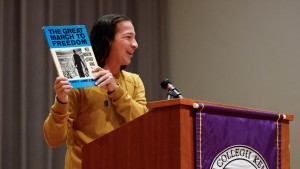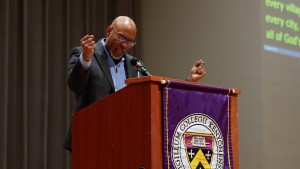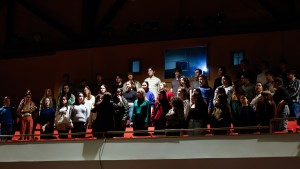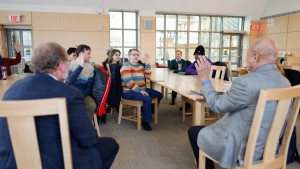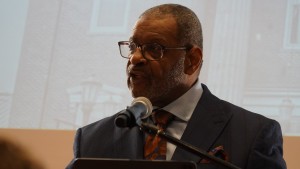Kenyon celebrated the life and legacy of Martin Luther King Jr. and the impact that one of the most famous speeches in American history continues to have during an event Monday in Rosse Hall.
The 60th anniversary of the March on Washington for Jobs and Freedom and the “I Have a Dream” speech took center stage in the event, designed to connect King’s legacy to current issues affecting Kenyon’s campus and the world. This year’s theme was “The Dream Speech 60 Years On: Facing the Paradox of Democracy.”
In her opening remarks, President Julie Kornfeld spoke of the enduring influence of Dr. King’s words from 1963.
“His speech was a powerful piece of oration that has inspired generations and — bridging sharp divides among people at the time — helped pave the way for future legislation. … But how well do we really know these words?”
According to a recent Pew Research Center study, she said, only 53 percent of younger adults, ages 18-29, have heard or read a “great deal” or “fair amount” about the speech. As part of the program, organized by the Office of Diversity, Equity and Inclusion and the Office of Campus Events, participants watched a recording of the entire speech.
Two faculty members served as featured speakers for the program: Francis Gourrier, assistant professor of American studies and history, and Jonathan Tazewell, Thomas S. Turgeon Professor of Drama and Film and chair of the American studies department.
Gourrier explained how the March on Washington and King’s speech called attention to the national implications of racial discrimination in the country — not just in the South — and had deep connections to the labor movement and calls for economic justice that had been brewing for some time.
The 1963 march, Gourrier said, had roots dating back to World War II, when Black trade unionist and labor leader A. Philip Randolph called for a march to protest racial discrimination in employment practices, particularly in the military production industry. (That march was called off after President Franklin Roosevelt issued an executive order that met Randolph’s demands.)
Tazewell focused on the performativity of King’s famous speech. He pointed out the multiple audiences King seemed to address — from government leaders with the ability to make change to workers in the audience with whom the metaphor of a bounced check certainly would resonate. King invoked references to everything from the Gettysburg Address and the Declaration of Independence to Shakespeare and the biblical prophet Amos.
But King’s tone and style shifted, Tazewell said, after the gospel singer Mahalia Jackson shouted to him, “Tell them about the dream,” referencing remarks she had heard him make two months earlier in Detroit. At this point, King paused and set aside his notes and began to speak extemporaneously — more in the style of a pastor than an academic — about his now famous dream.
The Day of Dialogue program was bookended by performances by the Chamber Singers and included two moderated breakout sessions. Professor of History Glenn McNair and Wendy Singer, associate provost and Roy T. Wortman Distinguished Professor of History, hosted a session on the historical context of the March on Washington and the “I Have a Dream” speech. Associate Provost for Diversity, Equity and Inclusion and Professor of English Ted Mason joined with Joe Klesner, professor of political science and international studies and director of the Center for the Study of American Democracy, to lead a discussion on the speech’s relation to democracy in a polarized environment.
Earlier in the day, Kornfeld joined with other educational and civic leaders in the community for Knox County’s Martin Luther King Day Celebration Breakfast at Mount Vernon Nazarene University, which cosponsors the event with Kenyon every year. Its theme — “Out of a Mountain of Despair, a Stone of Hope” — came from the words of the “I Have a Dream” speech. The keynote speaker was Bishop Edward Cook, state bishop of Ohio North First Jurisdiction for the Church of God in Christ.
